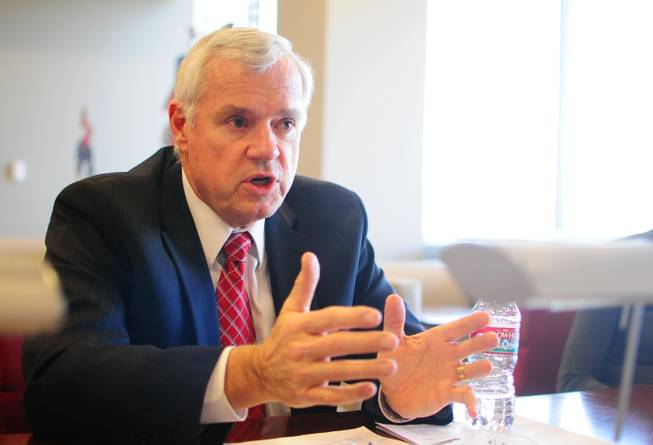
Nevada System of Higher Education Chancellor Dan Klaich discusses his legislative agenda, including the new funding formula, during a Las Vegas Sun editorial board meeting on Tuesday, Jan. 15, 2013.
Wednesday, Jan. 16, 2013 | noon
Related story
As Nevada recovers from the Great Recession, state leaders must begin reinvesting in its higher education system to produce a better-qualified workforce for a more diverse economy.
That's according to Nevada's higher education chancellor, Dan Klaich, who addressed challenges facing the university system in a wide-ranging conversation this week with the Sun editorial board.
The recession has forced brutal cuts to the state's seven public colleges and universities, forcing school leaders to become more thoughtful about their course offerings, Klaich said. The downturn has taught institutions to become more efficient, eliminating high-cost, low-yield programs while trying to assure the quality of education, he said.
"We're changing, and we're changing for the better," Klaich said. "(The recession) has left us with some smaller, narrower institutions, but I think they're stronger institutions."
But now that Nevada is showing some signs of an economic turnaround, its higher education leaders hope the era of budget cuts is now over. Klaich will be among the key players descending upon Carson City next month when the Legislature reconvenes to lobby for additional state funding.
For the first time since the recession began five years ago, Klaich is expecting NSHE's $472 million budget to hold steady, as indicated by Gov. Brian Sandoval. Although Klaich seemed willing to accept a flat budget, it won't be for much longer, he said.
State cuts to higher education have forced massive tuition hikes and faculty layoffs and furloughs. While it's unlikely that tuition will come down to prerecession levels anytime soon, Klaich hopes to restore faculty pay and benefits with additional state funding. The governor hasn't indicated his position on restoring faculty salaries in advance of his budget unveiling later today.
Klaich hopes that reinstating faculty benefits will help ensure Nevada colleges and universities – especially its top research institutions – can recruit and retain quality professors and researchers.
"This recession has hit us harder and will last longer than many places in the United States," Klaich said. "As other regions and state emerge from the recession ahead of us, they're going to start poaching our best people, hurting institutions like UNLV and UNR."
Chief among Klaich's priorities this upcoming Legislative session will be the passage of his new funding formula, which would replace a model that has been long criticized for being too complicated and unfair. Klaich's proposed new formula – in the works for more than a year – would shift the funding criteria from enrollment to completion, rewarding institutions for graduating more students.
"Revising the funding formula was a monumental effort. It's critical to the survival of the system," Klaich said. "(The old formula) was so profoundly mistrusted throughout the state that it had to go. I think we've put together something that we can stand up in front of everyone and say this is an equitable model."
Klaich plans to lobby for "mitigation money" to ease the transition from the old to the new funding formula. He also hopes the Legislature will put some money into the "Knowledge Fund," which was created during the last legislative session to help universities patent their research and bring those projects to market. Although the fund was approved conceptually, the Legislature failed to put any money into it.
Klaich's requests for more state funding may prove challenging. During the 2011 legislative session, some lawmakers criticized colleges and universities for not trimming enough from central administration. Klaich argued that universities have proportionately "overcut" from school administration the past four years to maintain student programs and services.
"I don't think we're heavy on administration at all," Klaich said. "But we'll keep an eye on it and look to drop as much money as we possibly can into the classrooms. (Administrative costs) should always be a concern because our job is not to administer. It's to teach, research and serve."
To better serve students – and perhaps to assuage skeptical lawmakers – Klaich promised more efficiencies in higher education, such as eliminating redundant programs and sharing functions between institutions. Klaich is also asking Nevada's three research institutions – UNLV, UNR and the Desert Research Institute – to seek outside funding for their research, which was historically state-funded. Although outside money is unlikely to solve these schools' funding woes in the short term, it will help raise the schools' rankings and reputation, Klaich said.
Increasing the profile of schools such as UNLV and UNR is important, Klaich said, because securing federal funding is so competitive. The vast proportion of grants from the vaunted National Science Foundation or the National Institutes of Health go to a select number of universities, usually among the top-ranked in the country.
"There's a bit of a syndrome where the rich is getting richer in this situation," Klaich said. "For Nevada to compete, our three research institutions must pool their research and teaching faculties to be more attractive for a competitive grant."
For example, it will be difficult for the hydrology and desert ecology researchers at UNLV, UNR and DRI to win a federal grant separately, Klaich said. However, with collaboration, a combined research group is more likely to succeed, he said.
"Our state and system is so small," Klaich said. "We are at such a competitive disadvantage in so many ways that we can't serve our communities and we can't serve our state unless we do it in a connected fashion."

Join the Discussion:
Check this out for a full explanation of our conversion to the LiveFyre commenting system and instructions on how to sign up for an account.
Full comments policy